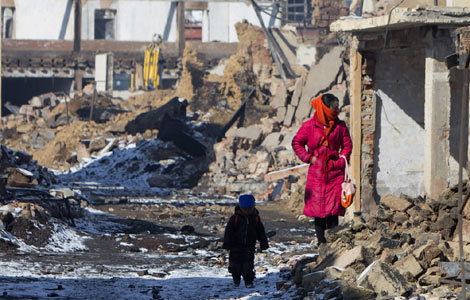Investment pact 'means better market access'
Updated: 2014-01-18 02:39
By YAO JING (China Daily)
|
|||||||||||
Negotiations between China and European Union to begin next week
China and the European Union will open negotiations next week on a bilateral investment agreement, EU Ambassador Markus Ederer told a news conference on Friday in Beijing.
The agreement is intended to consolidate and replace existing bilateral agreements with individual EU member states.
"I think both sides want to have smooth negotiations", said Ederer, who's leaving his post soon.
The agreement will mean "better market access, a more open government procurement market and also more opportunities in the service sector for both Chinese businesses and European companies," he said.
"You can see the potential in two-way trade and investment, which is very fundamental in a bilateral relationship," he said.
"We welcome Chinese investment in Europe, and we want to work on an investment agreement that will facilitate market access both ways — as a two-way street," Olli Rehn, the EU's economics commissioner, told the Wall Street Journal.
Even amid weak global economic conditions in recent years, EU-China trade has grown steadily. Bilateral trade expanded 2.1 percent last year to $559.06 billion, according to China's Ministry of Commerce.
Still, only 2 percent of the EU's total outward direct investment goes to China and only 3 percent of China's ODI flows into the EU, according to the ambassador.
Jiang Shixue, a researcher on European Studies at the Chinese Academy of Social Sciences, said China's "dynamic" investment in the EU is mainly a result of the government drive for Chinese companies to go global, as well as the EU's need for foreign capital.
"To attract more Chinese investment, aside from the investment agreement, the EU should provide more information about investing in Europe for Chinese entrepreneurs, and contain the idea of the 'China threat'," said Jiang.
China, meanwhile, confronts a tough global business environment, as developed economies are encouraging companies that have offshored production to return home. Those countries are also paying more attention to exports.
"In the global market, we are feeling the increasing pressure of trade protectionism and more competition from emerging markets," Shen Danyang, spokesman for the Ministry of Commerce, said during a news conference on Thursday
In terms of EU-China trade, Jiang forecast a "significant increase" in 2014.
However, Jiang warned that as China is still focusing on exporting labor-intensive products to Europe, it should look to diversify its exports.
"Of course, in order to reduce trade imbalances, Europe may ship more high-technology products to China," said Jiang.
When it comes to trade friction between China and Europe, Ederer expressed optimism and suggested that disputes can be resolved by using the case of solar panel exports from China as a model.
Bilateral investment treaty talks between China and the US wrapped up in Shanghai on Wednesday.
Related Stories
China overtakes EU as top export market for Singapore 2014-01-17 16:34
China, EU to start investment talks 2014-01-17 15:18
EU, China team up to create IPR project 2014-01-16 22:15
China reinvestigates anti-dumping duties on EU scanners 2014-01-10 21:41
China, EU partners in reform 2014-01-03 08:34
Today's Top News
Pressure rises on treating China's pollution
Beijing wants to attract more foreign experts
Looming baby boom no sweat: officials
Dumpling appetites grow after Xi drops in
Investment pact 'means better market access'
London sees RMB transactions rise
Li delivers economic reform vow
Obama bans spying on allies
Hot Topics
Lunar probe , China growth forecasts, Emission rules get tougher, China seen through 'colored lens', International board,
Editor's Picks

|

|

|

|

|

|





